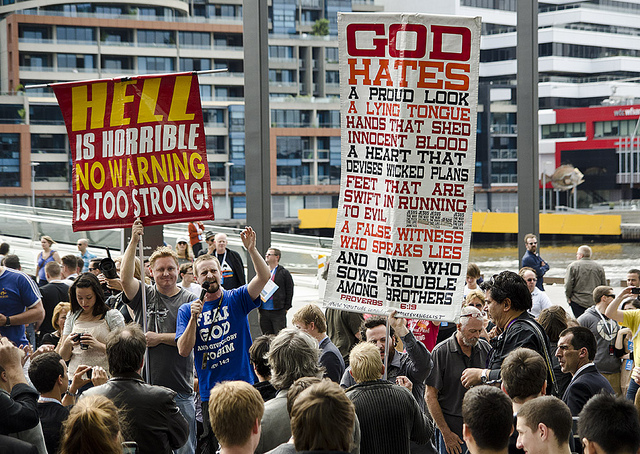Street Preachers – Giving Christianity a Bad Name
 Every major city has its street preachers. Standing near train stations and bus stops, in parks and public squares, they hold up signs, handout leaflets and proclaim messages about sin, death, heaven and hell. ‘Sinners deserve hell’; ‘Judgement is coming…seek Jesus now’; ‘God hates the wicked’. Whether purposeful or not, these preachers often come across as angry with a threatening message: repent or burn in hell. Every city may have them, but that does mean they are a positive addition to the tapestry.
Every major city has its street preachers. Standing near train stations and bus stops, in parks and public squares, they hold up signs, handout leaflets and proclaim messages about sin, death, heaven and hell. ‘Sinners deserve hell’; ‘Judgement is coming…seek Jesus now’; ‘God hates the wicked’. Whether purposeful or not, these preachers often come across as angry with a threatening message: repent or burn in hell. Every city may have them, but that does mean they are a positive addition to the tapestry.
I am convinced about one thing in regards this style of evangelist, they give Christianity (and religion in general) a bad name and create an even wider gulf between the non-believer and faith. In fact it’s not only non-believers who are their target; Hindus, Muslims and an assortment of Christians (Catholics, Pentecostals, Mormons) are informed in no uncertain terms that their faith is of the devil. Then of course there are the ‘standard sinners’ under attack as described via their placards; ‘fornicators, thieves, abortionists, liars, drunks, adulterers and sodomites’.
Open-air preaching is certainly nothing new. The great philosophers and sages of the ancient world discussed some of the noblest ideas in the public forum. Jesus of Nazareth spent three years in public ministry with much of that preaching to huge crowds on hillsides and in the market place. The mendicant friars of the middle ages such as the Franciscans and Dominicans were renowned as the wandering preachers of Western Europe. The Protestant Reformation has spurred numerous passionate preachers, with Billy Graham, affectionately known as ‘America’s Pastor’, topping that list. Lastly, one shouldn’t forget Bishop Fulton J. Sheen whose weekly television shows in the 1950s and 60s drew up to 30 million viewers per week earning him the title from Time Magazine as the first ‘televangelist’.
There is no problem with street preaching per se, the positing of ideas in the public square can challenge people to think outside their own personal experiences and views. Various countries have what is often called ‘Speakers Corner’ where open-air public speaking, debate and discussion is held. This is most notably found today in Hyde Park, London on the spot of the old Tyburn gallows where public executions were held and the condemned were given the opportunity to pronounce their final words.
Even if street preaching has venerable roots though, the general populous in the Western World is far softer than they once were and less prepared to hear ideas that are contrary or challenging to their own. In a politically correct ‘me generation’ there is a lack of critical thinking and the ability to reason objectively outside one’s own personal tastes. That is not to say though that the message of Christianity is only suited to a tougher audience, the core of Christianity is a message of love and a call to freedom, and while that can easily be high jacked, the message remains correct and does draw believers to seek to better themselves.
It is true that Jesus often got around saying “repent and believe” but it is also true that he knew where a person was at and so he would sit with adulterers by the side of the road or have dinner with tax collectors so as to be able to establish a relationship, to be able to diagnose exactly what that individual person was in need of. Telling people as they walk by the train station that they are going to hell does no one any favours because it is severely out of context and the rebuke is seen as a personal attack.
If you are game enough to debate fundamentalist street preachers they will tell you that they are simply preaching God’s message, yet while some aspects of their message may be true (i.e. we are all in need of ongoing conversion), if their presentation is only bringing about anger in those who hear them then they need to ask themselves if they are fairly representing a God whose chief description is said to be of love and His Son who metaphorically referred to himself as a gentle shepherd.
What modern (and growlingly secular) people most need to be told about is their fundamental goodness; yes we are fallen and yes we all have our personal struggles but God created man as good and good he remains. If fundamentalist street preachers by their actions make a person turn further from a possible return to God then they really will have something to answer for.


